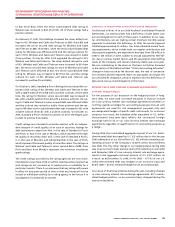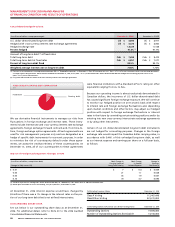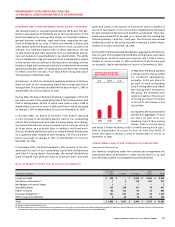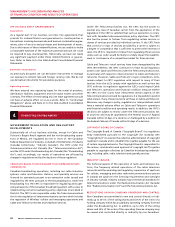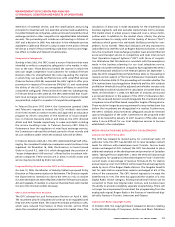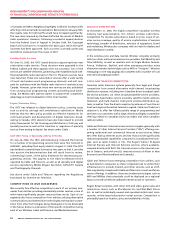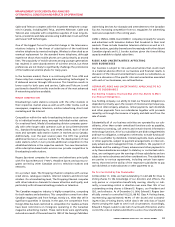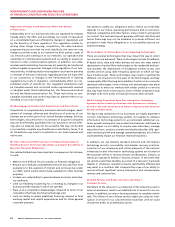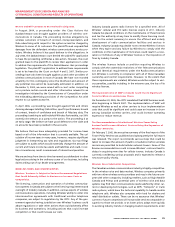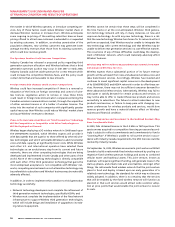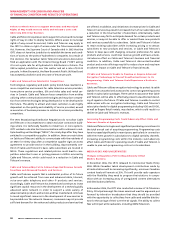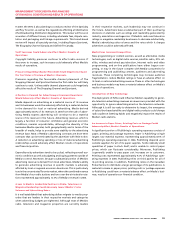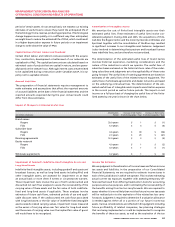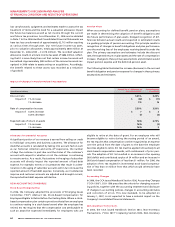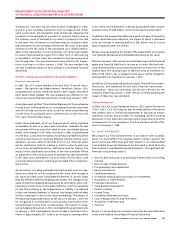Rogers 2006 Annual Report Download - page 59
Download and view the complete annual report
Please find page 59 of the 2006 Rogers annual report below. You can navigate through the pages in the report by either clicking on the pages listed below, or by using the keyword search tool below to find specific information within the annual report.
55
RO GER S CO MMU NIC AT ION S IN C . 20 0 6 ANN UA L RE POR T
MANAGEMENT’S DISCUSSION AND ANALYSIS
OF FINANCIAL CONDITION AND RESULTS OF OPERATIONS
We Are and Will Continue to Be Involved in Litigation.
In August 2004, a proceeding under the Class Actions Act
(Saskatchewan) was brought against providers of wireless com-
munications in Canada. The proceeding involves allegations by
wireless customers of breach of contract, misrepresentation, and
false advertising with respect to the system access fee charged by
Wireless to some of its customers. The plaintiffs seek unquantified
damages from the defendant wireless communications service pro-
viders. Wireless believes it has good defence to the allegations. In
July 2006, the Saskatchewan court denied the plaintiffs’ application
to have the proceeding certified as a class action. However, the court
granted leave to the plaintiffs to renew their applications in order
to address the requirements of the Saskatchewan class proceedings
legislation. The plaintiff’s application to address these requirements
is set to be heard by the Court on April 4 and 5, 2007. Similar pro-
ceedings have also been brought against us and other providers of
wireless communications in most of Canada. We have not recorded
a liability for this contingency since the likelihood and amount of
any potential loss cannot be reasonably estimated. In addition, on
December 9, 2004, we were served with a court order compelling
us to produce certain records and other information relevant to an
investigation initiated by the Commissioner of Competition under
the misleading advertising provisions of the Competition Act with
respect to our system access fee.
In April 2004, a proceeding was brought against Fido and others
claiming damages totalling $160 million, specific performance, breach
of contract, breach of confidence and breach of fiduciary duty. The
proceeding is seeking to add Inukshuk Wireless Partnership, our 50%
owned joint venture, as a party to the action. The proceeding is at
an early stage. We believe we have good defences to the claim and
no amounts have been provided in the accounts.
We believe that we have adequately provided for income taxes
based on all of the information that is currently available. The cal-
culation of income taxes in many cases, however, requires significant
judgment in interpreting tax rules and regulations. Our tax filings
are subject to audits which would materially change the amount of
current and future income tax assets and liabilities and could, in cer-
tain circumstances, result in assessment of interest and penalties.
We are and may from time to time be named as a defendant in other
legal actions arising in the ordinary course of our business, including
claims arising out of our dealer arrangements.
WIRELESS RISKS AND UNCERTAINTIES
Wireless’ Bu siness Is Su bject to Various Government Regulations
that Could Adver sely Affect Its B usiness or Increase Cost s or
Com petition.
The licencing, construction and operation of wireless communica-
tions systems in Canada are subject to the licencing requirements and
oversight of Industry Canada. In addition, various aspects of wireless
communications operations, including Wireless’ ability to enter into
interconnection agreements with traditional wireline telephone
companies, are subject to regulation by the CRTC. Any of the gov-
ernment agencies having jurisdiction over Wireless’ business could
adopt regulations or take other actions that could adversely affect
its business and operations, including actions that could increase
competition or that could increase our costs.
Industry Canada grants radio licences for a specified term. All of
Wireless’ cellular and PCS radio licences expire in 2011. Industry
Canada has placed conditions on the maintenance of these licences
and has the authority at any time to modify these licencing condi-
tions to the extent necessary to ensure the efficient and orderly
development of radio communication facilities and services in
Canada. Industry Canada may decide not to renew Wireless’ licences
when they expire and any failure by Wireless to comply with the
conditions on the maintenance of its licences could result in a revo-
cation or forfeiture of any of Wireless’ licences or the imposition of
fines by Industry Canada.
The wireless licences include a condition requiring Wireless to
comply with the ownership restrictions of the Telecommunications
Act and identical requirements under the Radiocommunication
Act. Wireless is currently in compliance with all of these Canadian
ownership and control requirements. However, to the extent that
these requirements are violated, Wireless would be subject to vari-
ous penalties, possibly including, in the extreme case, the loss of its
wireless licences.
The Implementation of WNP in Canada Could Create Significant
Costs for Wireless and Increase Churn.
On December 20, 2005, the CRTC mandated that WNP becomes avail-
able beginning in March 2007. The implementation of WNP will
require Wireless as well as other carriers to incur implementation
costs that could be significant and could cause an increase in churn
among Canadian wireless carriers, and could increase operating
expenses or reduce revenue.
The Recommendation of the National Wireless Tower Policy
Review Could Increase Wireless’ Costs or Delay the Expan sion of
Wireless’ Networks.
On February 7, 2005, the executive summary of the final report of the
Tower Policy Review was published and subsequently the full report
was released. The report recommends various steps that could be
taken to increase the amount of public consultation before wireless
carriers are permitted to build cellular network towers. Some of the
Review recommendations could increase Wireless’ costs and lead to
delays in acquiring new sites for cellular towers. Industry Canada is
currently considering various proposals and is expected to release a
new tower policy shortly.
Wireless Faces Substantial Com petition.
The Canadian wireless communications industry is highly-competitive.
In the wireless voice and data market, Wireless competes primarily
with two other wireless service providers and may in the future com-
pete with other companies, including resellers, such as Virgin Mobile
Canada and Primus and potential users of wireless voice and data
systems may find their communications needs satisfied by other cur-
rent or developing technologies, such as WiFi, “hotspots” or trunk
radio systems, which have the technical capability to handle mobile
telephone calls. Wireless also competes with rivals for dealers and
retail distribution outlets. There can be no assurance that Wireless’
current or future competitors will not provide services comparable or
superior to those we provide, or at lower prices, adapt more quickly
to evolving industry trends or changing market requirements, enter


